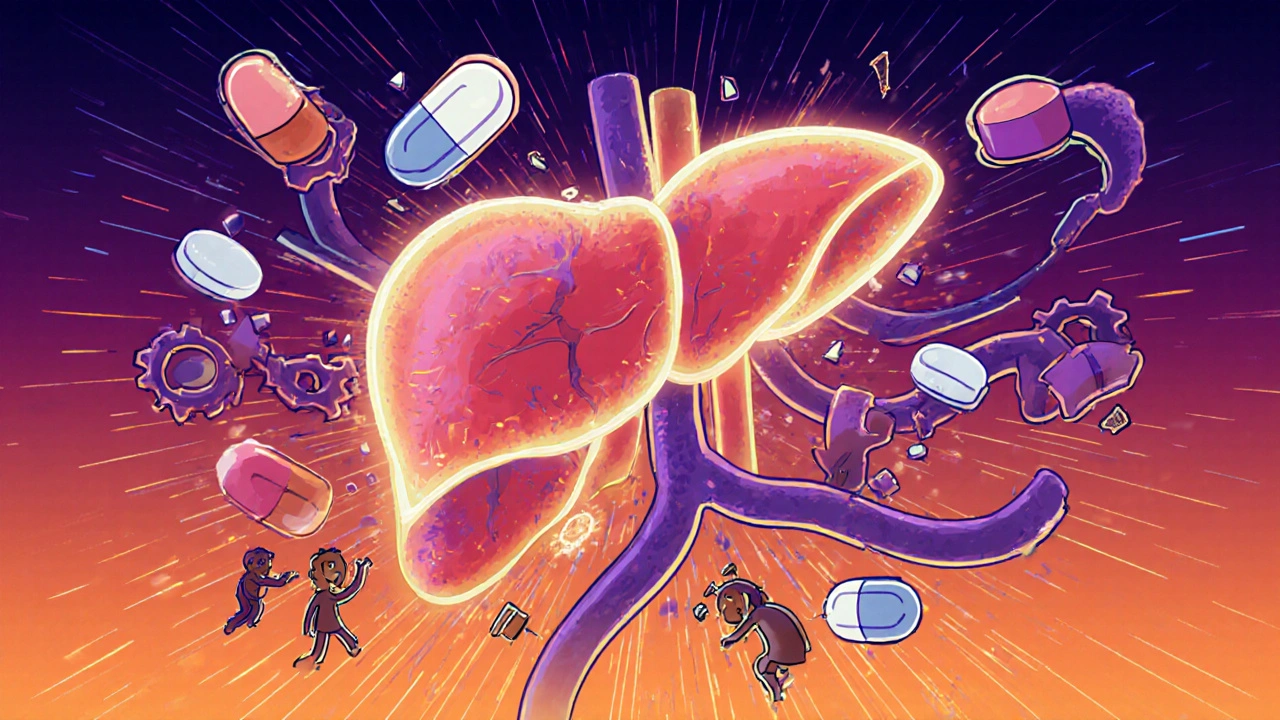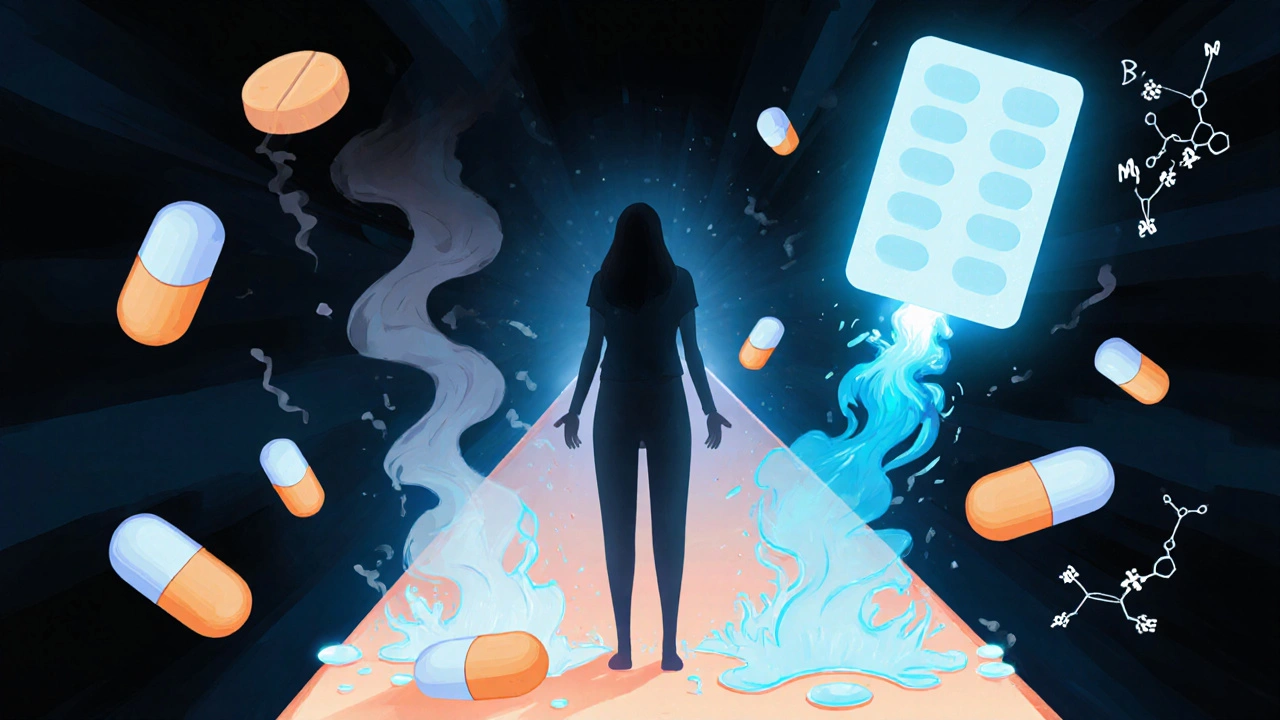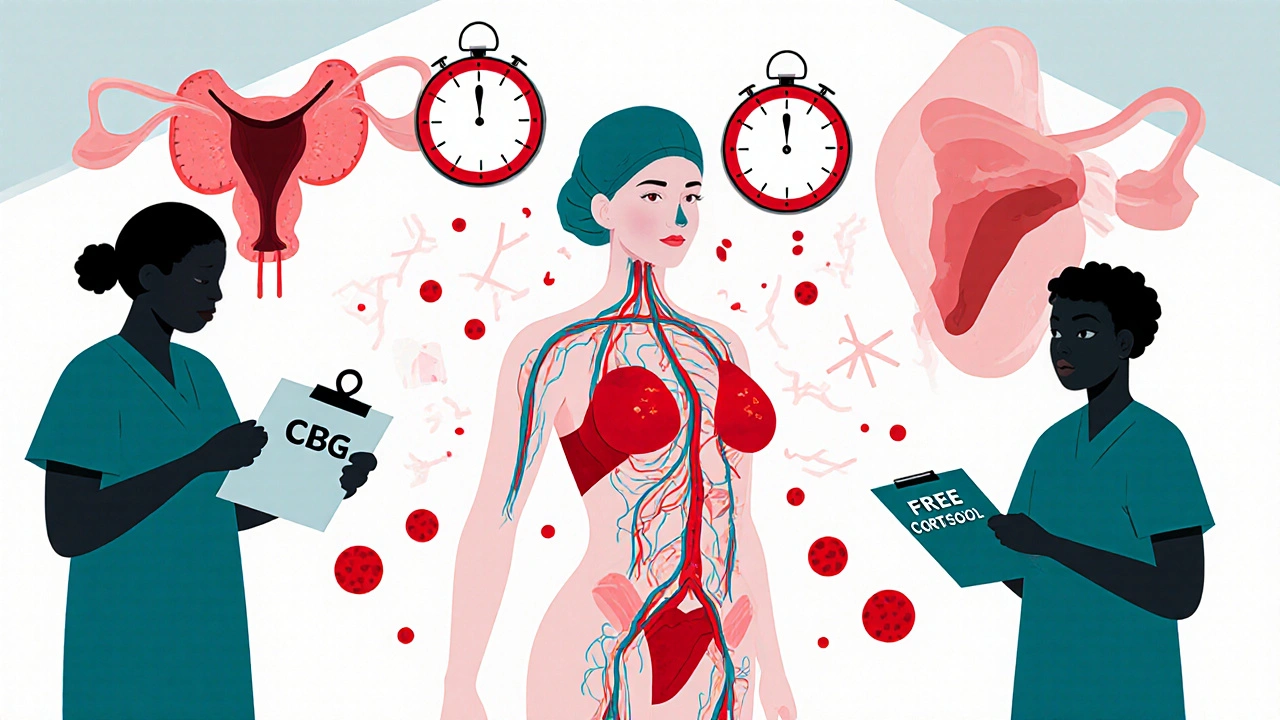
HRT Medication Interaction Checker
Check for Potential HRT Interactions
This tool helps you identify possible interactions between Hormone Replacement Therapy and medications you're currently taking. Results are based on medical research, but always consult your doctor for personalized advice.
When you start Hormone Replacement Therapy (HRT) for menopause, you’re not just adding one medication to your routine-you’re changing how your whole body processes everything else you take. Many women don’t realize that HRT can make their seizure meds less effective, mess with their thyroid tests, or even reduce the impact of antidepressants. These aren’t rare side effects. They’re well-documented, clinically significant interactions that can change your health outcomes.
Why HRT Changes How Other Drugs Work
HRT isn’t just estrogen or progesterone floating around in your blood. It’s a powerful signal to your liver. Estrogen, especially in oral form, tells your liver to make more of certain enzymes-like UGT1A4-that break down other medications. This means drugs that rely on those enzymes to stay active get cleared out faster. The result? Lower blood levels. Reduced effectiveness. And sometimes, dangerous consequences.
Take lamotrigine, a common drug for epilepsy and bipolar disorder. A 2022 report from the Netherlands Pharmacovigilance Centre Lareb showed that women taking Femoston (a combination of estradiol and dydrogesterone) had significantly lower lamotrigine levels after just five months. Their depression returned. Their seizures became harder to control. Once they stopped HRT, lamotrigine levels bounced back. This wasn’t a fluke. It’s a direct chemical interaction: estrogen increases enzyme activity, which speeds up lamotrigine metabolism.
Medications That Can Become Less Effective
If you’re on any of these drugs, HRT could be working against you:
- Lamotrigine (for seizures or mood disorders): Estrogen reduces its levels by up to 50% in some cases.
- Anticonvulsants like carbamazepine and phenytoin: These also speed up estrogen breakdown, making HRT less effective. It’s a two-way street.
- Antibiotics such as rifampicin and tetracycline: They can lower estrogen levels, reducing HRT’s symptom relief.
- HIV medications like protease inhibitors: These interfere with estrogen metabolism, leading to unpredictable hormone levels.
- St. John’s wort: This herbal remedy for mild depression speeds up liver breakdown of estrogen. NHS guidelines warn it can make HRT tablets stop working.
It’s not just about pills. Even common supplements can cause trouble. Resveratrol, found in red wine and grapes, has a chemical structure similar to synthetic estrogen. It might compete with HRT or alter its effects. Rosemary, often used in cooking or as a supplement, may boost the liver’s ability to deactivate estrogen-though evidence is still weak. The bottom line? Don’t assume natural means safe.
How HRT Affects Cortisol and Steroid Testing
If you’re taking hydrocortisone for adrenal insufficiency, HRT can make your blood tests useless. Female hormones-whether from birth control or HRT-cause your liver to produce more corticosteroid-binding globulin (CBG). This protein grabs onto cortisol, making it appear higher in standard blood tests. But the active, free cortisol? It hasn’t changed. That means your doctor can’t use the test to tell if your hydrocortisone dose is right.
This isn’t theoretical. The Pituitary Foundation specifically warns that women on both hydrocortisone and HRT need alternative monitoring methods-like 24-hour urine cortisol tests or clinical symptoms-because standard blood results are misleading. Ignoring this can lead to under-treatment, fatigue, or even adrenal crisis.

Transdermal Patches vs. Pills: A Key Difference
Not all HRT is the same. The way you take it changes everything.
Oral HRT-pills or capsules-goes straight to your liver. That’s where most of the enzyme activity happens. That’s why oral estrogen causes so many drug interactions.
Transdermal patches, gels, or sprays? They bypass the liver. The hormone enters your bloodstream through your skin. This means much less impact on liver enzymes. The NHS confirms that patches are less likely to interfere with other medications. If you’re on lamotrigine, St. John’s wort, or anticonvulsants, switching from pills to patches might be the safest move.
But here’s the catch: patches aren’t always available in all combinations. And they don’t eliminate all risks. If you’re on testosterone therapy alongside HRT, watch for swelling in your hands or feet-this can happen when testosterone and hydrocortisone are combined. Your doctor needs to know about every medication you’re taking, no matter how you take it.
What About Progesterone-Only HRT?
Many women assume progesterone-only therapies are safer. That’s often true-but not because they’re free of interactions. They’re just less studied.
Unlike estrogen, progesterone doesn’t strongly trigger liver enzymes that break down other drugs. So, if you’re on anticonvulsants or antidepressants, a progesterone-only HRT might be a better fit. But there’s limited data. Most interaction studies focus on combined estrogen-progestin therapies. That means your doctor might not have clear guidelines for you.
Also, progesterone can still affect blood clotting and blood pressure. If you’re on anticoagulants like warfarin, even progesterone-only HRT needs careful monitoring. The risk of blood clots doesn’t vanish just because you skip estrogen.
When to Stop HRT Before Surgery
Even if you’re not on other meds, HRT itself carries risks that require planning. MedlinePlus recommends stopping estrogen and progestin at least 4 to 6 weeks before major surgery-or any situation where you’ll be immobile for long periods.
Why? Because HRT increases your risk of blood clots. If you’re also a smoker, have high blood pressure, diabetes, lupus, or a history of stroke or heart attack, that risk jumps even higher. Stopping HRT ahead of time reduces the chance of a clot forming in your leg or lungs during recovery.
This isn’t optional. It’s standard practice. Yet many women don’t hear this until it’s too late. Always tell your surgeon you’re on HRT. Ask if you need to pause it before your procedure.

What You Should Do Right Now
If you’re on HRT and any other medication, supplement, or herbal remedy, here’s what to do:
- Make a full list of everything you take: prescriptions, over-the-counter drugs, vitamins, herbs, even occasional painkillers.
- Bring it to your doctor-not just your GP, but also your neurologist, psychiatrist, or endocrinologist if you see one.
- Ask specifically: “Could my HRT be affecting how my other meds work?” Don’t assume they know.
- Watch for warning signs: Sudden worsening of depression, new or more frequent seizures, unexplained swelling, headaches, vision changes, or shortness of breath. These could be signs of an interaction.
- Consider switching to a patch if you’re on oral HRT and taking lamotrigine, anticonvulsants, or St. John’s wort.
There’s no one-size-fits-all answer. Your body, your meds, your health history-they all matter. But the biggest mistake women make is staying silent. If you’re not talking about your HRT with your doctor, you’re flying blind.
What’s Missing From the Science
Here’s the uncomfortable truth: we don’t know everything. PubMed reviews show that most evidence on HRT interactions comes from biological plausibility-not large clinical trials. We know estrogen affects liver enzymes. We know lamotrigine levels drop. But we don’t have big studies showing exactly how many women are affected, or what the long-term outcomes are.
That’s why pharmacovigilance systems like Lareb are so important. They track real-world cases. The lamotrigine interaction was found because a woman reported her depression getting worse. That report led to changes in HRT labeling across Europe.
Until we have better data, the safest approach is caution. Assume interactions are possible. Test when needed. Monitor symptoms. Don’t wait for a crisis to act.
Final Thought: HRT Is Not Just for Hot Flashes
HRT doesn’t just help with night sweats. For many women, it’s the difference between managing daily life and being stuck at home. But it’s also a powerful drug. It doesn’t exist in a vacuum. It talks to every other drug in your system. And if you don’t know what it’s saying, you could be putting your health at risk.
There’s no shame in asking questions. There’s no shame in asking for a different form of HRT. There’s no shame in getting your blood levels checked. What’s dangerous is assuming everything’s fine because you feel better.
Can HRT make my antidepressants less effective?
Yes. Estrogen in HRT can lower levels of lamotrigine, which is often used for bipolar depression. It may also interfere with other antidepressants by altering how your liver processes them. If you notice your mood worsening after starting HRT, talk to your doctor. Blood tests for drug levels may be needed.
Is it safe to take St. John’s wort with HRT?
No. St. John’s wort speeds up the liver’s breakdown of estrogen, making HRT less effective. This can bring back menopause symptoms like hot flashes and night sweats. It can also increase the risk of breakthrough bleeding. The NHS and other health bodies strongly advise against combining them.
Do HRT patches have fewer interactions than pills?
Yes. Patches deliver estrogen through the skin, bypassing the liver. This means they don’t trigger the same enzyme activity that causes most drug interactions. If you’re on epilepsy meds, HIV drugs, or antibiotics, switching to a patch may reduce risks. But patches aren’t always available in all hormone combinations.
Can HRT affect my thyroid medication?
Estrogen can increase thyroid-binding globulin, which may lower the amount of free thyroid hormone available. This can make your levothyroxine less effective. If you’re on both, your doctor should check your TSH levels a few weeks after starting HRT and adjust your thyroid dose if needed.
Should I stop HRT before surgery?
Yes, if you’re having major surgery or will be immobile for a long time. Estrogen increases the risk of blood clots. Most guidelines recommend stopping HRT 4 to 6 weeks before surgery, especially if you smoke, have high blood pressure, or a history of clots or stroke. Always discuss this with your surgeon.
Can HRT interfere with blood pressure meds?
Estrogen can cause fluid retention, which may reduce the effectiveness of some blood pressure medications. If your blood pressure becomes harder to control after starting HRT, your doctor may need to adjust your antihypertensive dose or consider switching to a transdermal form.
Are bioidentical hormones safer with other drugs?
There’s no strong evidence that bioidentical hormones have fewer interactions than synthetic ones. They still contain estrogen or progesterone, which affect the same liver enzymes. Compounded bioidentical products aren’t regulated the same way, so dosing and purity can vary. This makes interactions harder to predict.
If you’re on HRT and any other medication, don’t wait for a problem to arise. Talk to your doctor now. Bring your list. Ask the questions. Your health depends on it.

12 Comments
Just switched from pills to patches after my seizures got worse on HRT. My neurologist was shocked I didn’t know this was a thing. If you’re on lamotrigine or anything similar, don’t wait for a crisis. Patch = life saver.
/p>bro i was on st johns wort for like 2 years thinking it was ‘natural’ and safe then my hot flashes came back HARD. my doc was like ‘dude you just turned your hrt into a placebo’ lol. now i just take the patch and forget the herbs. peace.
/p>so you’re telling me my depression got worse because my hrt was ‘eating’ my antidepressant? genius. thanks for the 101, doctor.
/p>For anyone on thyroid meds: yes, estrogen increases TBG, which binds T4 and makes your TSH look normal while you’re actually hypothyroid. Get free T4 and free T3 tested-not just TSH-after starting HRT. Most GPs don’t know this. I had to educate mine.
/p>Bioidentical hormones? Please. The FDA doesn’t regulate compounded versions. You’re playing Russian roulette with your liver enzymes. If you’re on HIV meds or anticoagulants, you’re not ‘natural’-you’re a walking pharmacokinetic disaster. Get FDA-approved. Period.
/p>They don’t want you to know this. Big Pharma doesn’t profit from patches. They profit from pills. And they profit from your seizures. Your doctor won’t tell you this unless you ask. They’re trained to treat symptoms-not systems.
/p>People act like this is new information. It’s been in the medical literature since 2005. If you’re on HRT and not monitoring drug levels, you’re not being proactive-you’re being negligent. This isn’t ‘alternative medicine.’ This is clinical pharmacology 101.
/p>So you’re telling me women are dying because they didn’t read the fine print? Shocking. Next you’ll say smoking causes cancer. At least this isn’t like vaping or gluten. This is just basic biology. If you can’t handle it, don’t take hormones.
/p>My doc told me to stop HRT before my knee surgery. I didn’t believe him. I got a DVT in recovery. Don’t be me. Stop it. 6 weeks. No excuses.
/p>Oh wow. So the same estrogen that gives me my sanity also makes my blood thinner useless? Cool. So what’s the plan? Do I just stop being a woman or stop being alive?
/p>They’re all lying to you. The FDA, your doctor, Big Pharma-they all want you on pills because they make more money. Patches are cheaper. Safer. But they don’t advertise them. Why? Because they’re not patented. Wake up.
/p>This is a Western conspiracy. In Nigeria, women take HRT with herbal tea and never have problems. You over-medicate everything. Your liver is weak because you eat processed food. Stop blaming your hormones. Fix your diet.
/p>